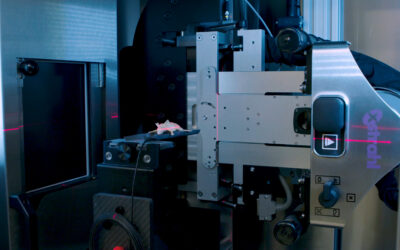The immune infiltrate in colorectal cancer has been correlated with outcome, such that individuals with higher infiltrations of T cells have increased survival independent of the disease stage. For patients with lower immune infiltrates, overall survival is limited. Because the patients with colorectal cancer studied have received conventional cancer therapies, these data may indicate that the pretreatment tumor environment increases the efficacy of treatments such as chemotherapy, surgery, and radiotherapy. This study was designed to test the hypothesis that an improved immune environment in the tumor at the time of treatment will increase the efficacy of radiotherapy. We demonstrate that inhibition of TGFβ using the orally available small-molecule inhibitor SM16 improved the immune environment of tumors in mice and significantly improved the efficacy of subsequent radiotherapy. This effect was not due to changes in radiosensitivity, epithelial-mesenchymal transition, or changes in vascular function in the tumor; rather, this effect was dependent on adaptive immunity and resulted in long-term protective immunity in cured mice. These data demonstrate that immunotherapy is an option to improve the immune status of patients with poor tumor infiltrates and that pretreatment improves the efficacy of radiotherapy.
Objectives
Researchers in this study focused on inhibition of TGFB using small molecule inhibitor SM16.
Methods
The SARRP was used to treat orthotopic pancreatic tumors. They used CT contrast agent, lipuodol, to precisely target the tumor within the soft tissue and deliver radiation using an arc to minimize the damage to normal tissue but deliver a full dose to the target. They delivered a 3 fractions of 8 Gy, total dose of 24 Gy using a 180 degree arc treatment with a 5 x 5 mm irradiation field.
Results
They found that the TGFb inhibtor significantly improved outcomes but not as a result in changes in radiosensitivity or vascular function but as a result of improved long-term immunity in mice.
Young KH, Newell P, Cottam B, Friedman D, Savage T, Baird JR, Akporiaye E, Gough MJ & Crittenden M.







